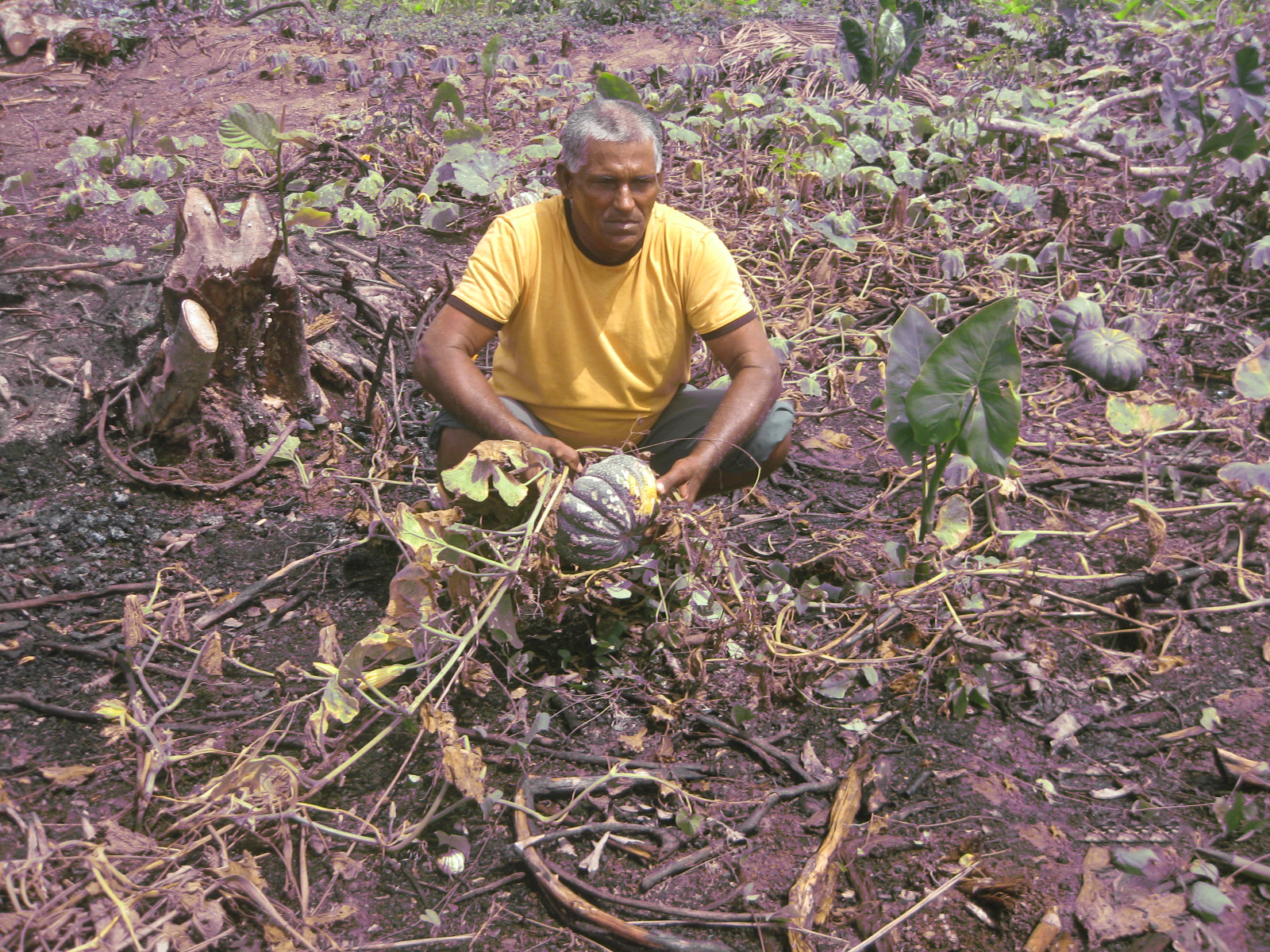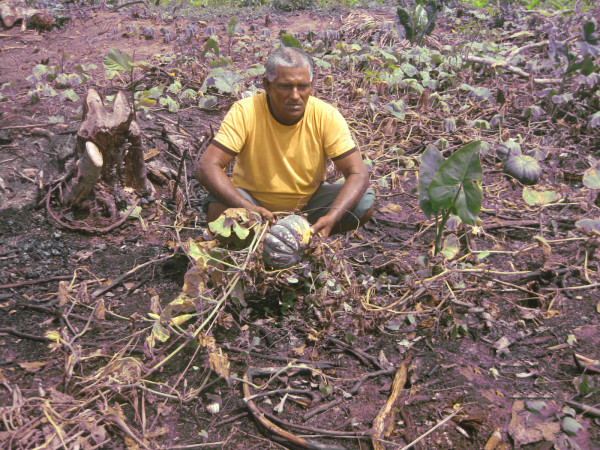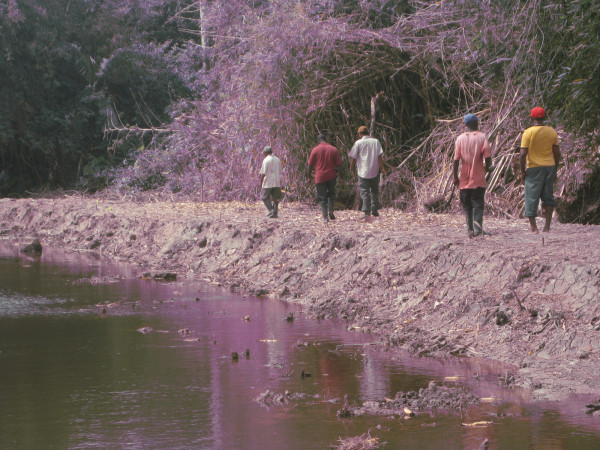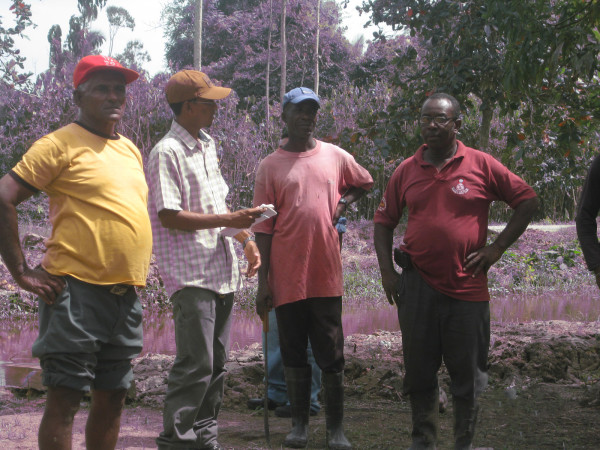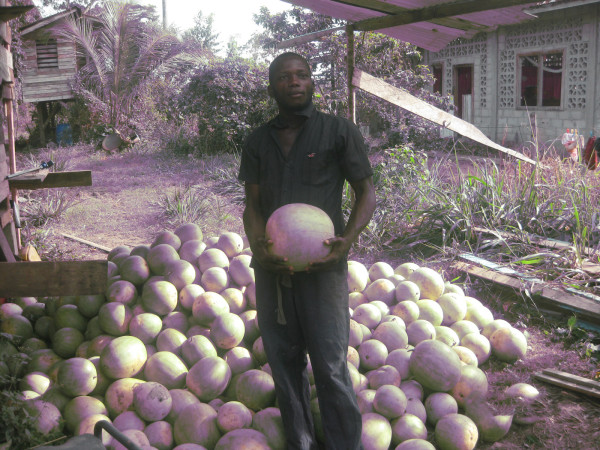Residents of Lighttown Village, East Bank Berbice are peeved over the unnecessary loss of their cash crops, as a result of a recently built dam along the riverside in the agricultural community.
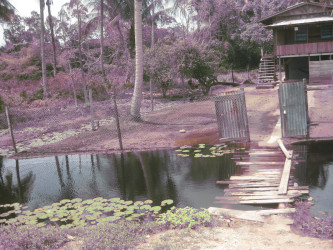
The earthen dam, which was built over three months ago, through a Ministry of Public Infrastructure initiative, is aimed at preventing the river water from flowing on to the land. However, provision was not made for an outlet, which would allow rain water to flow off the land, and as a result, there has been flooding and loss of crops, during the recent unexpected rainfall.
Jagessar Seeram, a green vegetable farmer for over 30 years, took local reporters to his farm where he was forced to reap, prematurely, pumpkins that needed another three weeks.
Because of the recent heavy rainfall over the last two weeks, 300 pounds of the crop were lost, while the remainder was retrieved and is awaiting a market.
“I loss big. I normally invest my pension monies into the crop. If the sea defence team had inserted a tubing, creating an outlet for the rain water, the waters would have receded, and we could have saved some of the crop. Or we could have started to replant,” Seeram said, as he removed some of the water-soaked vines and premature vegetables from his cultivation plot.
Meanwhile, another farmer Leon Ramsey, acknowledged the importance of the river defence, but also lamented the fact that there was no outlet.
“When the rain fall, the place flood. The water has nowhere to go,” Ramsay said. “The water is killing the crops, such as pumpkins, squash, ochro, bora, bitter melons [carilla], red peas, boulanger. These crops were affected because there is no outlet.”
Ramsey suggested that the channel, which is blocked, should be dug out and polythene tubing placed within to allow the excessive water to flow into the nearby Berbice River.
Affected also was watermelon farmer Jermaine Thomas, who had sowed his seeds in December, but was faced with the severe dry spell and insufficient water supply.
As a result his melons “punished to grow,” he said. But with recent sudden rainfall, the fruits started to burst open, so he had to pick some prematurely from the backlands.
Thomas expressed concern over the impact of El Nino on his farming and called for the relevant authorities to improve the irrigation along the East Bank Berbice cultivating areas.
“We are not fortunate to get water. The irrigation system is poor. We need earthen pools to store water during the dry period,” he said.
During a visit on Tuesday, this reporter observed a Żubroń bull grazing at a higher level from the watery land below, while empty barrels lined roadway awaiting potable water from the relevant services.
Retired Probation and Welfare officer Mithford Ward, now an agriculturalist, reiterated the concerns of his peers.
“As a result of our concerns and losses, a meeting was held with Regional Chairman David Armogan who immediately dispatched an engineer to assess the damage and to recommend solutions, by visiting the various points to have a first-hand look at the challenges,” Ward said.
However, the farmers were told that the National Drainage and Irrigation Agency machinery, which could be used to get the water off the land, was currently not workable. But, they were assured that with some contracts currently handed out, machines will be operable soon, and the farmers’ issues will be addressed within a three-week period.
“We are looking forward to them [regional officials] keeping their promise, as the crops are dying and the water is stagnant, as there is no outlet for the rain water to exit the land,” Ward said.
He posited that with the machinery being accessible by the end of March, work can be undertaken before the seasonal rains, which are expected during the May/June period.
If not, he said, “…By then, persons may have to relocate, as houses and livestock will be under threat… With this long El Nino spell, it is not impossible for the rains to come early, as it has been months since we have had significant rainfall. It is hoped that the project would be undertaken shortly, as it can be dangerous to have heavy machinery operating along the river side, which is generally a slushy area, during rainfall… It can [cause] the machine [to] sink into the mud, and lives can be put at risk.”
